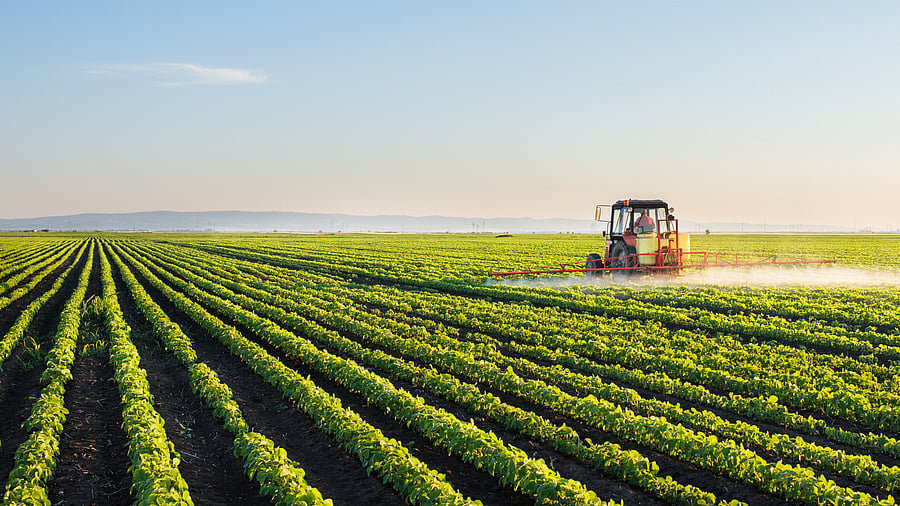
Representative image of a farm
Credit: iStock Photo
Farmers in rural Vermont, US are using urine as a fertiliser to boost harvests and employ a more sustainable way of growing crops. This method was used in ancient Rome and China, according to a report by the BBC.
A non-profit organisation based in Vermont, Rich Earth Institute (REI) runs a programme called Urine Nutrient Reclamation Program (UNRP) which collects and recycles urine - or 'peecycled', to be used as fertiliser for agriculture.
Betsy Williams is one of the 250 people in Windham County who takes part in this programme. A total of 45.400 litres of urine is collected from the county annually.
The urine is collected by a lorry from Windham County and taken to a large tank where it is pasturised. The urine is heated to 80C for 90 seconds and then is stored in a pasturised tank, ready to be sprayed on local farmland when it is time to fertilise crops.
As per the report, Betsy Williams who has been doing this for the last 12 years said, "We're consuming all of these things that have nutrients in them, and a lot of the nutrients that are passing through us can then get recycled back into helping create food for us and for animals. So to me, it's logical."
Farmers of ancient Rome and China employed this technique. According to the findings of scientists today, urine can more than double the yield of crops such as kale and spinach when compared to no fertiliser and even improve yields in low fertility soils.
The nitrogen and phosphorus present in urine makes it a good fertiliser. Nitrogen and phosphorus are added to synthetic fertilisers used by farmers, however, these have an ill-effect on the environment. Nitrogen is produced using the fossil fuel-intensive process Haber-Bosch, while mining of phosphorus creates harmful amounts of toxic waste. On the other hand urine is freely available and "everybody peed. (It's an) untapped resource" as Betsy says.
A professor of civil and environment engineering at the University of Michigan, Nancy Love, who collaborates with REI, says using urine in lieu of synthetic fertilisers reduces the emission of greenhouse gases and requires around half the amount of water.
As per UNRP estimates, since 2012,10.2 litres of water have been conserved by preventing toilet flushes.
The nutrients that are found in urine find their way into waterways. The nitrogen and phosphorus present in the urine does not get fully removed from wastewater even after getting treated. In rivers and lakes, these nutrients are food for algae which can result in algal blooms that choke waterways, unbalance the ecosystem and kill other species that inhabit the water bodies.
Jamina Shupack, REI's Executive Director says, "Our bodies create a lot of nutrients, and right now, those nutrients are not only wasted, but they’re actually causing a lot of problems and harm downstream."
The REI team and farmers also take the necessary steps to ensure minimal urine runs off the land and into water bodies. According to the report, the steps taken to prevent run-off into water bodies include carefully timed application. The urine is sprayed when the plant is able to absorb most of the nutrients and soil moisture is measured to ensure the urine will be absorbed. However, there is still some runoff that happens.
'Peecycling' reduces the overall amount of nutrients entering waterbodies as it ensures that runoff from the land is the only way excess nutrients enter rivers and lakes.
There are challenges to this process. There is a demand for urine by farmers, however, scaling up collection is difficult and regulations are also a challenge.
The other challenges that the organisation faces is that urine is heavy and difficult to transport. Collecting and moving the urine creates emissions. In Vermont, the urine is transported locally but expanding this programme will require the urine to be transported over long distances. According to the report, REI's spinoff company has developed a freeze concentration system that concentrates urine by six times, and is currently being used at the University of Michigan.
While UNRO in Vermont helms 'peecycling' in US, other countries are following the suit. In Paris, volunteers are collecting urine to help save River Seine and fertilise wheat for baguettes and biscuits. Recognising the ill-effects of algal blooms around the island of Gotland, Swedish entrepreneurs have developed a product that collects urine and turns it into fertilisers. South Africa, Nepal and Niger Republic are also employing this technique.
